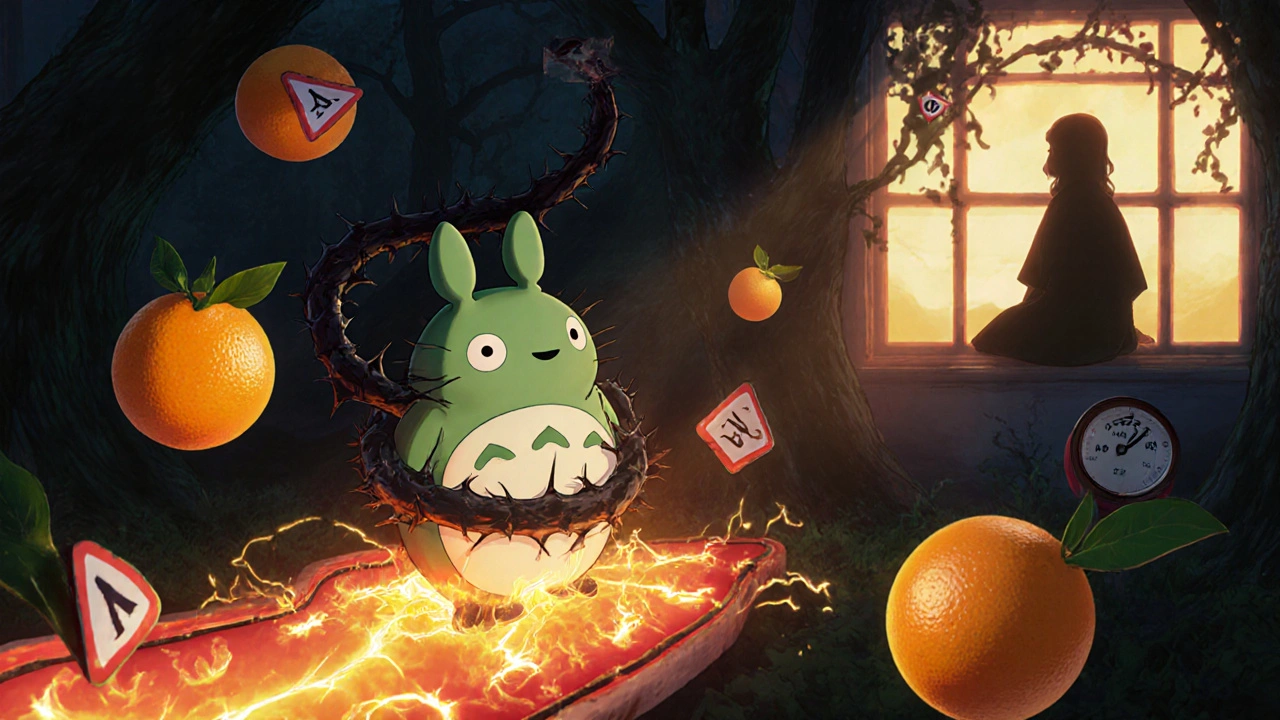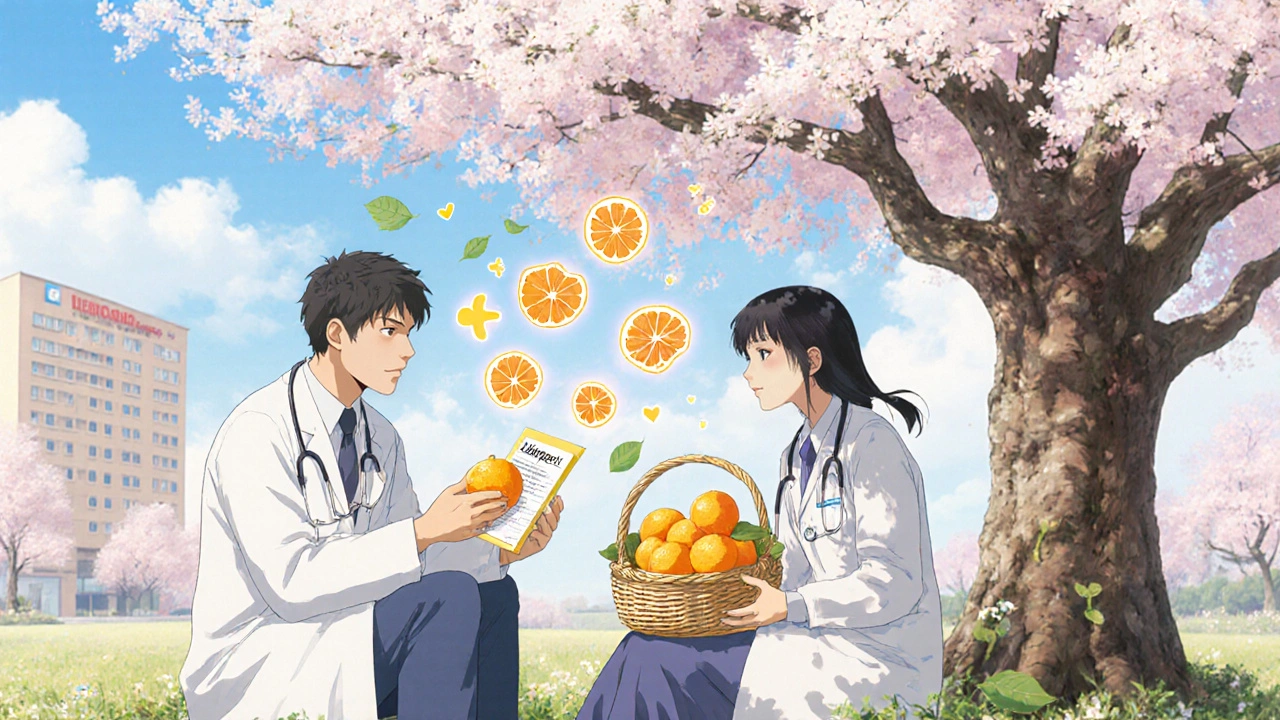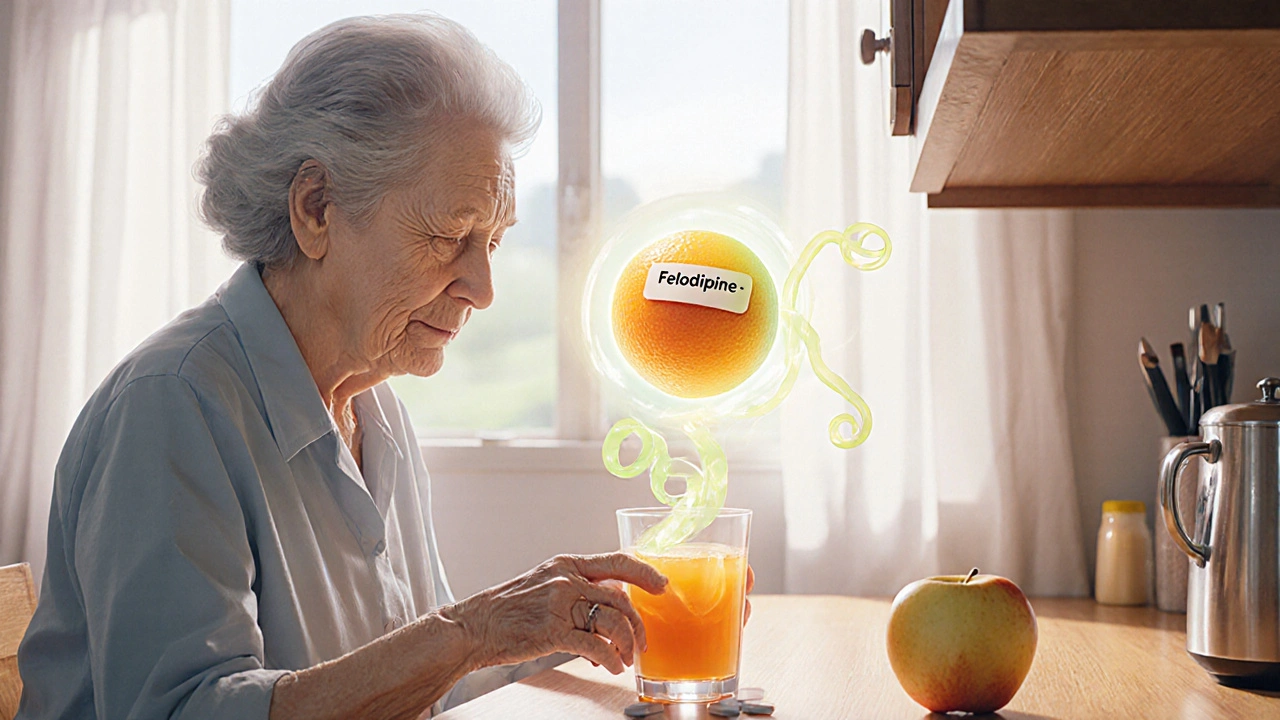If you're taking a calcium channel blocker for high blood pressure, and you love your morning glass of grapefruit juice, you might be risking more than just a sour taste. This isn't just a myth or a vague warning-it's a real, measurable, and potentially dangerous interaction that can turn your prescribed dose into something far stronger than your doctor intended.
Why Grapefruit Is a Problem
Grapefruit doesn't just taste different from other citrus fruits-it acts differently in your body. The problem lies in chemicals called furanocoumarins, found in high amounts in grapefruit and its close relatives like Seville oranges and tangelos. These compounds shut down an enzyme in your gut called CYP3A4, which normally breaks down certain medications before they enter your bloodstream. When this enzyme is blocked, your body absorbs way more of the drug than it should. For calcium channel blockers like felodipine, that means your blood levels can jump 3 to 5 times higher than normal. One 200ml glass of grapefruit juice is enough to trigger this effect-and it doesn’t matter if you drink it hours before or after your pill. The enzyme stays disabled for up to 72 hours.Which Calcium Channel Blockers Are Affected?
Not all calcium channel blockers react the same way. The ones most at risk are the dihydropyridine group:- Felodipine - The most sensitive. Grapefruit can boost its levels by up to 500%.
- Nicardipine and Nimodipine - Also strongly affected.
- Amlodipine - Less dramatic, but still risky. Even small increases can cause side effects in older adults or those with kidney issues.
Non-dihydropyridines like verapamil and diltiazem are less affected, but they’re not completely safe. And even if your doctor says your specific drug is low-risk, there’s no guarantee your body won’t react differently.
What Happens When the Interaction Occurs?
Too much calcium channel blocker in your system means your blood pressure drops too far, too fast. Symptoms can include:- Dizziness or lightheadedness
- Flushing or feeling unusually warm
- Swelling in your ankles or feet
- Fast or irregular heartbeat
- Fainting or near-fainting episodes
These aren’t just uncomfortable-they’re dangerous. Especially for older adults. One nurse practitioner, Amelie Hollier, described a case where an elderly patient couldn’t stand after taking her usual dose with grapefruit juice. What was meant to be a 60mg dose ended up acting like 140mg. That’s not a typo. That’s what happens when your body can’t break the drug down.

It’s Not Just Juice
You might think avoiding grapefruit juice is enough. But it’s not. Fresh grapefruit, grapefruit segments, even some grapefruit-flavored sodas or candies can contain enough furanocoumarins to cause problems. Seville oranges (used in marmalade) are just as risky. Tangelos and pomelos are also unsafe.Regular sweet oranges? You’re probably fine. They have almost no furanocoumarins. Same with mandarins and clementines. Orange juice from supermarkets? Most are made from sweet oranges and are considered safe. But always check the label-if it says “grapefruit blend” or “citrus blend,” skip it.
What Should You Do?
If you’re on a calcium channel blocker, here’s what to do:- Ask your pharmacist or doctor if your specific medication is affected. Don’t assume it’s safe.
- Avoid grapefruit and its close relatives entirely while taking the drug. Even occasional use is risky.
- Read your medication guide. Many prescriptions for felodipine, nimodipine, and others now carry explicit warnings.
- Check other medications. Grapefruit also interacts with statins, some anti-anxiety drugs, and immunosuppressants. If you take multiple prescriptions, this interaction could be stacking up.
Some patients worry they’ll have to give up citrus forever. But you don’t. You just need to swap grapefruit for safer options. Swap grapefruit for an apple. Swap grapefruit juice for orange juice (made from sweet oranges). Swap the morning ritual entirely for water or herbal tea.

What Are the Alternatives?
If you love citrus and can’t imagine giving it up, talk to your doctor about switching to a blood pressure medication that doesn’t interact with grapefruit. Safe alternatives include:- ACE inhibitors like lisinopril
- ARBs like valsartan
- Thiazide diuretics like hydrochlorothiazide
- Some beta blockers like metoprolol
These work just as well for lowering blood pressure, and they don’t care if you eat an orange with your breakfast.
Why This Keeps Happening
Despite decades of research, this interaction is still overlooked. A 2022 survey found only 37% of primary care doctors routinely ask patients about grapefruit use when prescribing calcium channel blockers. And 68% of patients had no idea this was even a risk.It’s not that doctors are careless. It’s that the warning is buried in dense medical literature, and patients rarely bring it up. You might think, “I only have a little bit,” or “I’ve been doing this for years.” But the science doesn’t care about your habits. One glass, one time, can be enough to send you to the ER.
Each year in the U.S. alone, about 15,000 emergency visits are linked to grapefruit-drug interactions. Most of them involve blood pressure medications. This isn’t rare. It’s common-and preventable.
The Future Is Changing
There’s good news on the horizon. Two new extended-release versions of amlodipine are in late-stage clinical trials, designed to reduce grapefruit interaction by 70%. These aren’t available yet, but they signal a shift toward safer drug design.Until then, the safest choice is simple: know your meds. Know your citrus. And if you’re unsure, don’t guess. Ask.
Can I drink orange juice with my calcium channel blocker?
Yes, if it’s made from sweet oranges (like navel or Valencia). These don’t contain the harmful compounds found in grapefruit. Avoid any juice labeled as “grapefruit blend,” “citrus blend,” or “tangelo.” Always check the ingredients list.
How long should I wait after eating grapefruit before taking my medication?
You can’t wait it out. The enzyme inhibition lasts up to 72 hours. Even if you eat grapefruit at breakfast and take your pill at night, the interaction still happens. The only safe approach is to avoid grapefruit completely while on the medication.
Is grapefruit the only citrus fruit that causes problems?
No. Seville oranges (used in marmalade), pomelos, and tangelos also contain furanocoumarins and should be avoided. Regular oranges, mandarins, and clementines are safe. The risk comes from specific types of citrus-not all citrus.
What if I accidentally ate grapefruit while on my medication?
Don’t panic, but monitor yourself. Watch for dizziness, swelling, rapid heartbeat, or fainting. If you feel unwell, contact your doctor or pharmacist immediately. If symptoms are severe-like passing out or chest pain-seek emergency care. Going forward, avoid grapefruit completely until you talk to your provider.
Can I switch to a different blood pressure pill to avoid this?
Yes. Medications like lisinopril, valsartan, hydrochlorothiazide, and metoprolol don’t interact with grapefruit. Talk to your doctor about whether switching is right for you. Your blood pressure control can stay just as effective-without the citrus risk.


Let’s be real-this isn’t just about grapefruit. It’s about how pharmaceutical companies design drugs without considering real human behavior. We’re not lab rats. We have rituals. Morning juice, weekend brunches, holiday traditions. And now we’re told to erase decades of habit because a single enzyme got a bad rap? The science is solid, sure. But the delivery? Pure fear-mongering wrapped in a white coat. We need better education, not just warnings. People aren’t dumb-they’re just not told the why, only the don’t.
And let’s not forget: if your doctor doesn’t ask about your citrus intake, they’re not doing their job. This interaction isn’t obscure. It’s been documented since the 90s. Why is it still slipping through the cracks?
Wow. So I’ve been drinking grapefruit juice with my amlodipine for 8 years and I haven’t turned into a human popsicle yet. Guess I’m just lucky? Or maybe my body’s got its own little CYP3A4 firewall.
But seriously-this post is terrifyingly well-researched. Like, I feel like I just read a medical journal article written by someone who’s seen too many ER visits. Thanks for the clarity. I’m switching to orange juice tomorrow. Also, I now hate pomelos.
Also also-why does no one ever warn you about the marmalade? I put that on my toast like it’s oxygen. 😅
okay so i just read this and my whole morning routine just imploded 😭
i’ve been drinking grapefruit juice since college because it ‘tastes like sunshine’ and now i’m realizing i’ve been playing russian roulette with my blood pressure. i feel like a idiot.
but also-thank you? like, seriously. i’ve been on this med for 3 years and no one ever mentioned this. not my doctor, not my pharmacist, not even the little pamphlet that came with my bottle.
switching to orange juice today. also going to ask my doc about switching meds. maybe i can get something that lets me keep my citrus fix? 🍊❤️
Interesting read. I’m Irish and we don’t really drink grapefruit juice here, but I’ve seen this come up in my pharmacy work. The 72-hour window is the real kicker. People think ‘I had it yesterday, so I’m fine’-nope. The enzyme’s still down. It’s like turning off a light switch and expecting the room to stay dark forever.
Also, the fact that 68% of patients don’t know this? That’s a systemic failure. Not the patient’s fault. The system didn’t communicate. We need better labeling. Maybe QR codes on bottles that link to a 30-second explainer video. People don’t read pamphlets. They watch TikToks.
This is such an important post. 💙
I’m so glad someone took the time to break this down clearly. So many people are on these meds and just assume ‘citrus = safe.’ But it’s not. And the consequences can be life-altering.
To anyone reading this: please, please talk to your doctor. Don’t wait until something bad happens. And if you’re feeling overwhelmed about giving up grapefruit-swap it for an apple. Or a banana. Or just water. You’re worth more than a tangy morning drink.
And if you’re a healthcare provider? Please ask. Just ask. It takes 10 seconds. 🙏
So I just checked my fridge. Yep. Half a grapefruit. Two cartons of ‘citrus blend’ juice. One jar of Seville orange marmalade. 😳
That’s my entire breakfast routine gone. I’m devastated. But also… relieved? Like, I’d been feeling kinda dizzy after breakfast lately and thought it was just ‘getting old.’ Turns out I was just slowly poisoning myself.
Going to switch to orange juice tomorrow. And maybe start a ‘safe citrus’ playlist? 🍊🎶
Thanks for the heads-up. This saved me from a hospital trip for sure.
Don’t eat grapefruit. Don’t drink it. Don’t touch it. Don’t smell it. Don’t even look at it. Your blood pressure doesn’t care how much you love it. The enzyme doesn’t care about your feelings. The ER doesn’t care about your routine. Avoid it. Full stop.
Also: orange juice is fine. Check the label. Sweet orange. Not blend. Not tangelo. Not pomelo. Just orange. Simple.
Ask your pharmacist. Do it now.
Done.
Bro this is wild. I thought grapefruit juice was just one of those ‘old wives’ tales’ like ‘don’t swim after eating.’ 😅
But now I’m like… wait, my grandpa took felodipine and he loved his grapefruit. He’s still alive… kinda. But he’s always falling asleep in his chair. Was that…? 😳
Anyway, I’m switching to orange juice now. And I’m gonna tell my whole family. This needs to be common knowledge. Like ‘don’t text and drive’ level awareness.
Also, if you’re on statins too? Double check. I think I’m on both. 🤯
Thanks for the heads-up, this post literally saved me. 🙏🍊